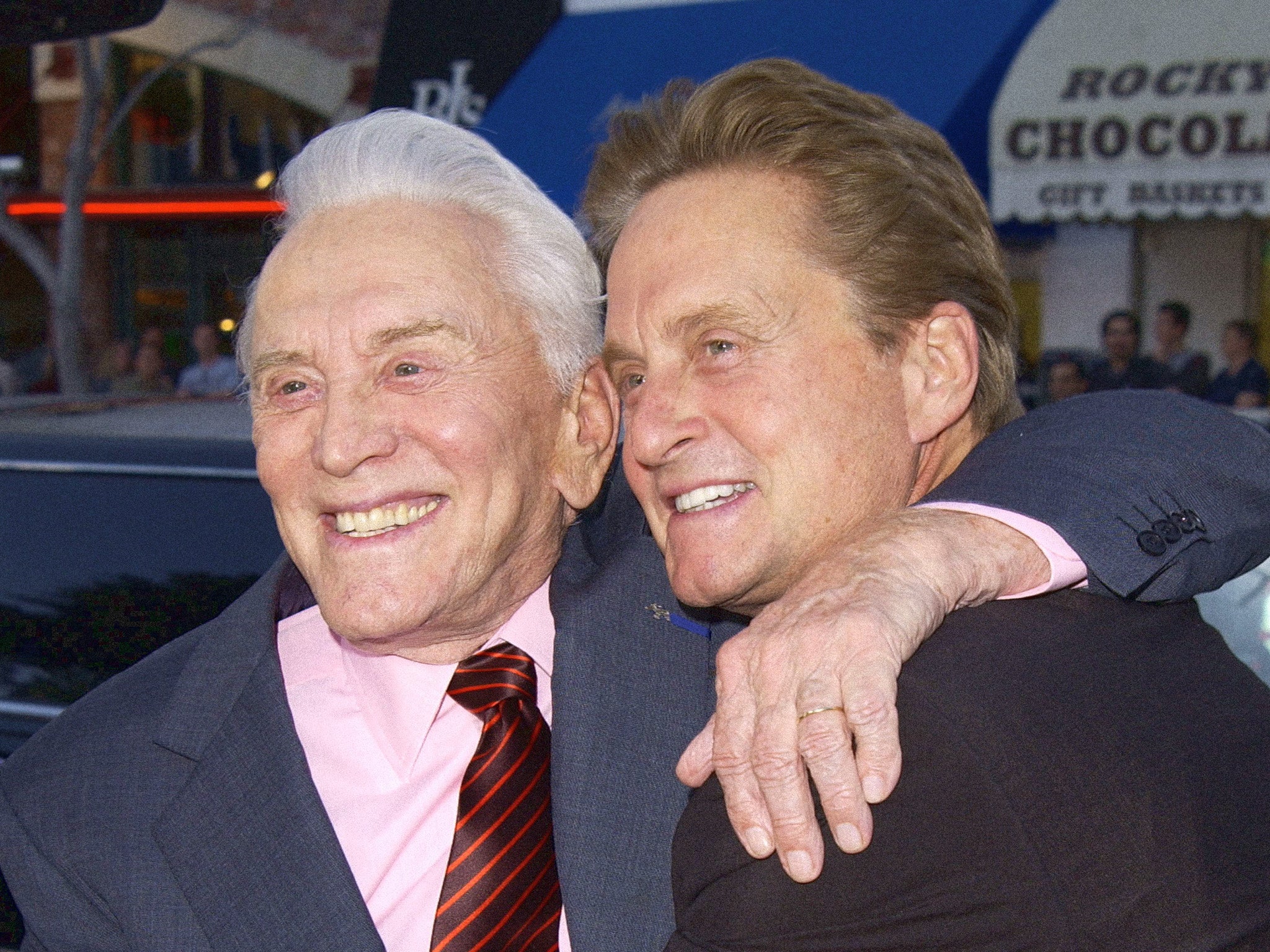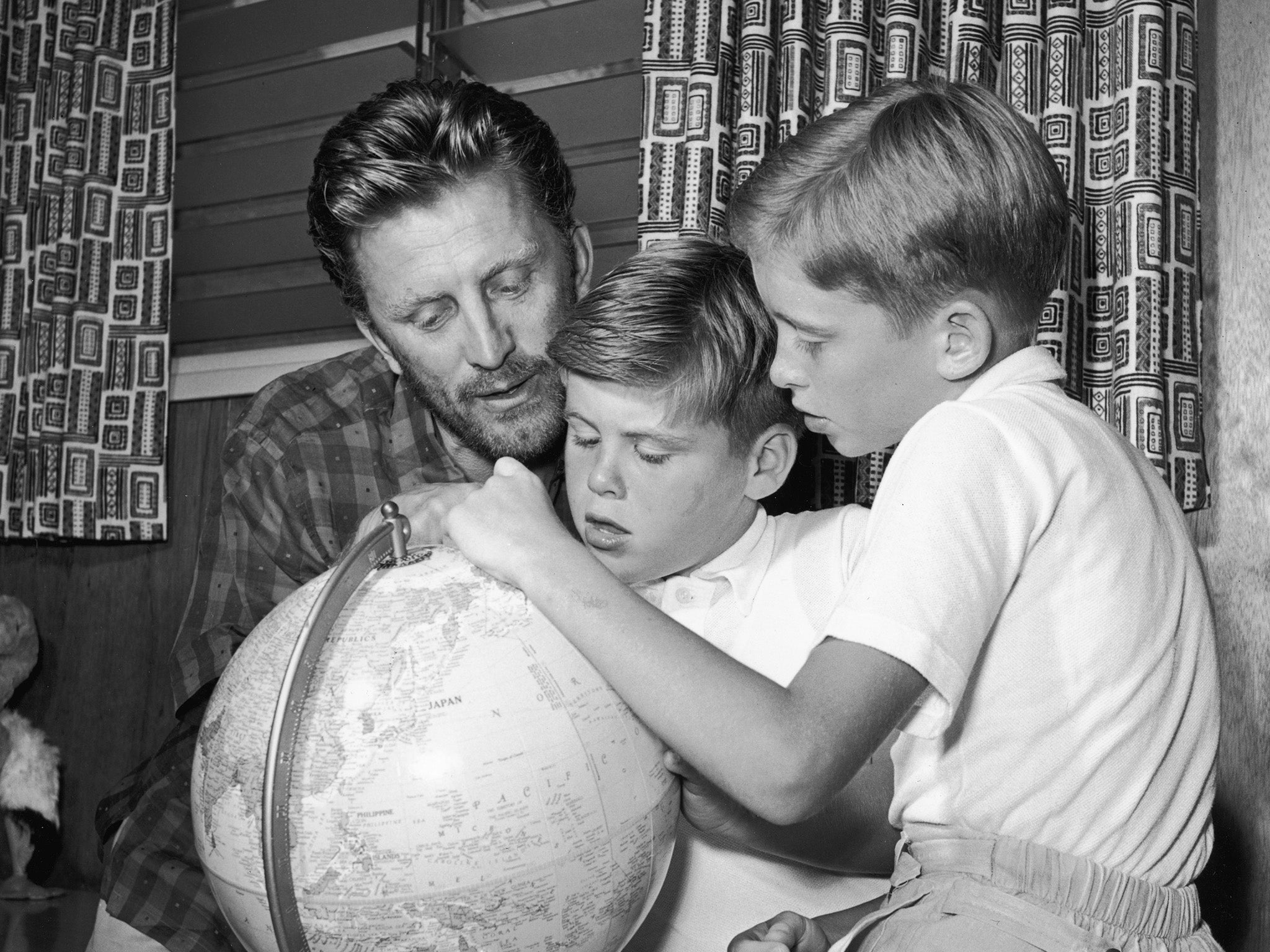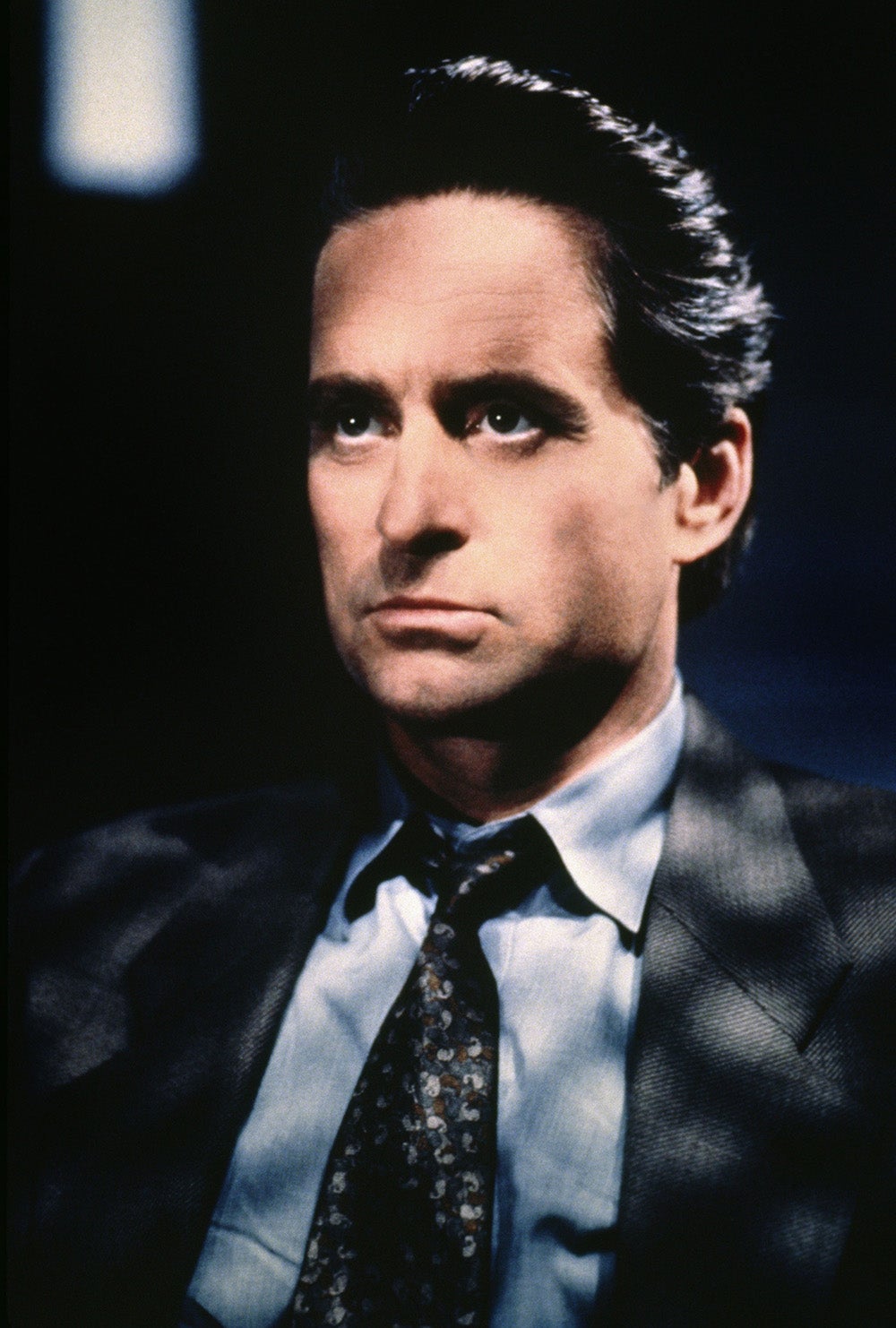Michael Douglas was never his father Kirk – he was better
A new documentary on the ‘Wall Street’ and ‘Fatal Attraction’ star explores the life and career of an actor who had to fight to get out from under his father’s shadow, writes Geoffrey Macnab. How did he do it?

There’s a strange story about the Hollywood legend Kirk Douglas, who died in 2020, watching one of his old movies late at night on TV. Try as he might, he just couldn’t remember which one it was. “And then I realised it wasn’t me,” he told his son (and fellow actor) Michael Douglas. “It was you…” It’s a throwaway anecdote contained in Marc Eliot’s 2012 biography of the Wall Street and Fatal Attraction star, but sums up perfectly the enormous challenges Douglas has faced in putting clear space between himself and the father he so closely resembles.
At the opening of the Cannes Film Festival next week, Douglas will receive an honorary Palme D’Or in “recognition of his brilliant career”. Douglas has a long association with Cannes. He first walked up the red carpet with nuclear disaster drama The China Syndrome in 1979, and has been back to the French Riviera with such movies as Paul Verhoeven’s “sulphurous” (as the Cannes press office calls it) erotic thriller Basic Instinct (1992), Joel Schumacher’s Falling Down (1993), in which he played an American everyman turned baseball-bat-wielding vigilante, and Steven Soderbergh’s Behind the Candelabra (2013), in which he gave one of his most delightful performances as the high camp entertainer, Liberace.
These are just some of the immensely varied roles Michael has played over the last 50 years. You can add to them louche professors (Wonder Boys in 2000), adulterous yuppies in peril (1987’s Fatal Attraction), money-hungry monsters (his Gordon Gekko in 1987’s Wall Street), rugged Indiana Jones types (1984’s Romancing the Stone), conservative judges (2000’s Traffic), nerdy Marvel scientists (Hank Pym in the Ant-Man movies) and curmudgeonly old actors (Netflix’s The Kominsky Method). Nonetheless, almost every book or article about him frames his story as a real-life Oedipal drama. Even Cannes invokes Kirk’s name as it pays what it calls “a vibrant tribute” to his son.
The tangled synopsis of the documentary Michael Douglas, The Prodigal Son – directed by Amine Mestari and screening in Cannes as part of the festival’s tribute to the actor – reads that by “retracing his tormented life, this documentary shows us how Michael, an actor and producer like his father, will have had, throughout his exceptional career, to accept their resemblance in order to affirm his difference.”
In the documentary, episodes in Michael Douglas’s life and career are looked at through the prism of his father’s experiences. “It’s the main angle of my film, how to become Michael when your second name is Douglas,” Mestari tells me. “How can you [come] out from the shadow of your father? On one hand, it’s a chance to have a famous father and certainly because the father of Michael was Kirk it was more easy for him to start in the movie industry. But at the same time, everyone – until he won his Oscar for Wall Street – compared Michael to his father. They said to him ‘the way you look, the way you walk, it’s just like your father’. I think it was a burden for him.”
It’s true. Michael is the spitting image of his old man, right down to the dimple on his chin. Like his father, he is a producer as well as an actor. They shared many personality traits, too. Kirk Douglas was a notorious womaniser. When it was reported in the early Nineties that Michael had been sent to rehab for sex addiction, Kirk quipped: “I didn’t realise that was a problem.”
One day I said I lie every day. What is acting about except lying? That freed me up a whole lot
“He had some addiction problems like two of his brothers, like his son,” Mestari reflects. “For Michael, it’s a delicate issue. In his family, there is this problem with alcohol, drugs and sex, all kinds of addiction.” Given this back story, you might expect the star to be defensive and reclusive with the press. Mestari says the opposite was true. When he interviewed Douglas for his film, he marvelled at how friendly and open the star was toward him. “Before the interview, I talked with his personal assistant and asked if there is some topic maybe Michael prefers not to talk about and he said ‘no, just ask and you will see’. I could ask him any question I wanted.”
Arguably, the real epiphany in Douglas’s career came not from observing his father but from watching Louise Fletcher, who had co-starred in Milos Forman’s multi-Oscar winning One Flew Over the Cuckoo’s Nest (1975) adapted from Ken Kesey’s 1962 novel and which Michael produced alongside Saul Zaentz. Fletcher played the cruel and sadistic Nurse Ratched who terrorises the patients in the mental institute. Douglas bought the rights to the Kesey book from his father. A decade before, Kirk had played the lead character, RP McMurphy, on stage and was desperate to revive his McMurphy on screen. But he hadn’t been able to convince anyone to back a screen adaptation. By the time the film was underway, he was too old to play it. Several big names including Marlon Brando turned down the role before Jack Nicholson signed on. As for Nurse Ratched, no A-lister in Hollywood would go near such a part. Jane Fonda and Faye Dunaway were among the stars who turned up their noses. The character was just so… nasty. Only Fletcher had no compunctions about playing such an unsympathetic harridan – and she won an Oscar for her efforts.
“The truth be told, a villain is the way to go,” Douglas explained in a 2011 podcast interview with fellow actor Alec Baldwin. It had dawned on him early that if you were the bad guy, you almost always got the best lines. Before that epiphany, Douglas did his share of bland leading parts. He was a clean-cut homicide cop alongside the older Karl Malden in the long-running Seventies TV series, The Streets of San Francisco. His character was conscientious, decent, hard-working – certainly not the type you could imagine having feral sex with Glenn Close or Sharon Stone, or living it large on Wall Street.

As soon as Douglas turned to the dark side, his acting career began to prosper. If there was one speech which changed the perception of him in Hollywood and freed him from the burden of having always to compete with his father, it was in Oliver Stone’s Wall Street (1987), when his Mephistophelian financier Gekko proclaimed the joys of avarice. “Greed, for lack of a better word, is good. Greed is right. Greed works. Greed clarifies, cuts through and captures the essence of the evolutionary spirit.” He is speaking softly but has a demonic intensity.
Douglas’s turn as Gekko inspired generations of young Americans to pursue extreme wealth. In his podcast with Baldwin, the actor spoke in exasperation about the number of times he had been accosted by drunks in suits who thanked him for turning them on to careers in high finance. When he explained to them that Gekko was the villain of the film and not its hero, he said they simply wouldn’t listen.
Kirk Douglas was characterised on screen by his relentless drive, his “lust for life” (to borrow the title of the overwrought 1956 biopic in which he played artist Vincent Van Gogh). Whether as a boxer (1949’s Champion), an unscrupulous journalist in search of a career-saving scoop (1951’s Ace in the Hole), a rebellious Roman slave (1960’s Spartacus) or a French First World War officer taking on his degenerate, bloodthirsty superiors (1957’s Paths of Glory), Douglas Senior always gave the impression that he would steamroll over anybody or anything that got in his way. “I was born aggressive and I guess I’ll die aggressive,” he wrote in his autobiography.
In spite of their physical similarities, though, Michael Douglas isn’t quite the same on screen as his father. While he can emulate Kirk’s machismo and aggression, he has a sensitivity and vulnerability. As critic David Thomson wrote in his Biographical Dictionary of Cinema, Douglas Junior shows “a rare ability to be strong and weak at the same time. There is in his eyes, his jaw, his hairline, and his voice the memory of his father. But there is also something like his horror at being so like Kirk.”

When Douglas made his run of seminal movies in the late Eighties and early Nineties, he was turned into a sex symbol, becoming famous for playing troubled characters closer to the types James Stewart played in Fifties Hitchcock movies – hardly the alpha males his father had perfected. He talked in interviews of the appeal of “portraying obsessive lust amid seeming decency and normality.” His choice of roles was astute, too. Thanks to Fatal Attraction, Wall Street and 1994’s sexual harassment thriller Disclosure, the then middle-aged star became a lightning rod for era-defining cultural debates about money, sex and power.
Douglas isn’t a method actor who inhabits a role. He is more of a chameleon who sees screen acting as an exercise in deception. “Someone told me early on that the camera would always tell when you were lying,” he once said. “One day I said I lie every day. What is acting about except lying? That freed me up a whole lot.”
Do we ever get a glimpse of the real Douglas on screen? Mestari tells me there is one movie in which he seems close to himself – and that is in Fatal Attraction. “Before I started to make this film, I looked at 41 or 42 of the 45 or 46 films Michael made… in Fatal Attraction, I had the impression I was seeing the real Michael Douglas. I didn’t feel the acting!” It’s a strange remark given that he’s playing a cheating husband who ends up in a battle for his life with a vengeful woman. But Mestari’s point is that Douglas here is utterly natural. He may not be able to match his father’s relentless ferocity, but at his best he brings an emotional depth and subtlety to his roles that big Kirk simply can’t match.
Michael Douglas will receive the Palme d’or d’honneur at the 76th Festival de Cannes. The festival will pay tribute to him during the opening ceremony on 16 May. ‘Michael Douglas, The Prodigal Son’ will be shown at the festival site for two days, from Sunday 14 May at 6pm to Tuesday 16 May at 6pm
Subscribe to Independent Premium to bookmark this article
Want to bookmark your favourite articles and stories to read or reference later? Start your Independent Premium subscription today.



Join our commenting forum
Join thought-provoking conversations, follow other Independent readers and see their replies
Comments